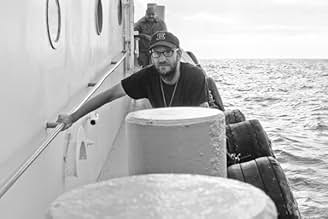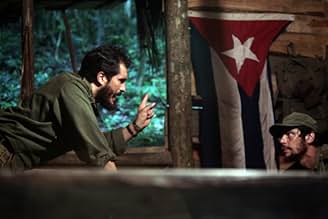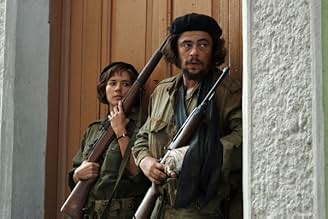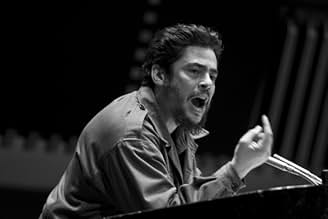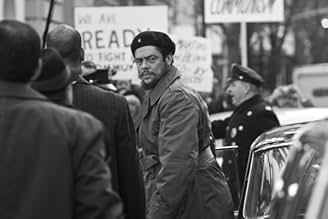1956 में, अर्नेस्टो 'चे' ग्वेरा और कास्त्रो के नेतृत्व वाले क्यूबा के निर्वासितों के एक दल ने तानाशाह फुलगेनसियो बतिस्ता के शासन को खत्म करने के लिए एक सेना जुटाई.1956 में, अर्नेस्टो 'चे' ग्वेरा और कास्त्रो के नेतृत्व वाले क्यूबा के निर्वासितों के एक दल ने तानाशाह फुलगेनसियो बतिस्ता के शासन को खत्म करने के लिए एक सेना जुटाई.1956 में, अर्नेस्टो 'चे' ग्वेरा और कास्त्रो के नेतृत्व वाले क्यूबा के निर्वासितों के एक दल ने तानाशाह फुलगेनसियो बतिस्ता के शासन को खत्म करने के लिए एक सेना जुटाई.
- निर्देशक
- लेखक
- स्टार
- पुरस्कार
- 4 जीत और कुल 13 नामांकन
- Interpreter
- (as Óscar Isaac)
- María Antonia
- (as María Isabel Díaz)
- Fidel Castro
- (as Demian Bichir)
- Héctor
- (as Ramón Fernández)
- Alejandro Ramírez
- (as Yul Vázquez)
- Jorge Sotús
- (as Jsu García)
- Rebel Messenger #1
- (as Luis Rodríguez Sánchez)
- Juan Almeida
- (as Roberto Luis Santana)
फ़ीचर्ड समीक्षाएं
Of course, the icon that I refer to is quite obviously Cuban revolutionist Ernesto 'Che' Guevara here played by Benicio Del Toro, a figure now embellished upon the memories of those with slightest interest in political history. If not, then you probably have his face on a t-shirt somewhere and you didn't know. Yet it doesn't matter how or why you know of Guevara before you view Che because Peter Buchman does a fine job of introducing you to him here. Plus, coupled with a performance that never begs for attention but instead simply plays the man he's supposed to be portraying with no overt padding, Del Toro goes a long way to giving Che the right amount of conviction that is needed to keep thing interesting and dynamic. Make no mistake, this is no dramatization of the man's life, so Del Toro never piles on the melodrama or anything to that degree to win over the audience, and this is reflected not only through the movie's ensemble of performances, but through the entire production itself.
Had the feature remained its original singular, five hour form however, a different opinion may have been garnered, but as it stands, the movie does well on its own merit. Part One, which details the initial struggle of the revolution of Cuba, is less about Guevara and more about his cause under the leadership of Fidel Castro. Granted, focus is shifted every now and again to set up part two's inevitable centralization upon Che himself, but for the most part, Part One remains more as a wide-angled view on the movement in which Guevara was part of. This shift in focus does well to once again distance the movie away from mere speculative entertainment and more towards the form of an educational informant. Yes, there are scenes that drag on and on, and generally some of these seem superfluous and dubious to the overall arc of the production, but for the most part, the script and direction remains coherent in its willingness to merely document rather than emote.
As a whole, Che's first half is an unassuming picture. At first glance, it isn't anything remotely special, and probably won't provide viewers with any degree of resonance if they are not interested in the man and his people's struggle beforehand, yet the same can be said for a number of similar features. Instead, I can only recommend this to those who are interested in the revolution and don't mind slow paced, attention-demanding material that does entertain from time to time, but only as a natural result of its historical importance. Again, those looking for a character piece similar to Stone's portrayal of George W. Bush last year would be wise to reevaluate their will to see Che; although titled after the man himself, and a biopic on a purely ostensible level, Che is more about his fight than the man himself. There are no real moments of personal insight here, no cathartic revelations or studies of psyche. No, instead the movie tells the facts as they were, straight from the horses mouth, and while they can sometimes work against the common desires of cinema goers' need for personal fulfillment, if digested objectively, can provide a strongly engaging, interesting and informative piece of historically significant art.
- A review by Jamie Robert Ward (http://www.invocus.net)
If you are patient enough to sit through the over four hours, with an intermission between the two sections, there are rewards. There's an authentic feel throughout--fortunately Soderbergh made the decision to film in Spanish (though some of the actors, oddly enough in the English segments especially, are wooden). You get a good outline of what guerrilla warfare, Che style, was like: the teaching, the recruitment of campesinos, the morality, the discipline, the hardship, and the fighting--as well as Che's gradual morphing from company doctor to full-fledged military leader. Use of a new 9-pound 35 mm-quality RED "digital high performance cine camera" that just became available in time for filming enabled DP Peter Andrews and his crew to produce images that are a bit cold, but at times still sing, and are always sharp and smooth.
The film is in two parts--Soderbergh is calling them two "films," and the plan is to release them commercially as such. First is The Argentine, depicting Che's leadership in jungle and town fighting that led up to the fall of Havana in the late 50's, and the second is Guerrilla, and concerns Che's failed effort nearly a decade later in Bolivia to spearhead a revolution, a fruitful mission that led to Guevara's capture and execution in 1967. The second part was to have been the original film and was written first and, I think, shot first. Producer Laura Bickford says that part two is more of a thriller, while part one is more of an action film with big battle scenes. Yes, but both parts have a lot in common--too much--since both spend a large part of their time following the guerrillas through rough country. Guerrilla an unmitigated downer since the Bolivian revolt was doomed from the start. The group of Cubans who tried to lead it didn't get a friendly reception from the Bolivian campesinos, who suspected foreigners, and thought of the Cuban communists as godless rapists. There is a third part, a kind of celebratory black and white interval made up of Che's speech at the United Nations in 1964 and interviews with him at that time, but that is inter-cut in the first segment. The first part also has Fidel and is considerably more upbeat, leading as it does to the victory in Santa Clara in 1959 that led to the fall of the dictatorship of Fulgencio Batista in Cuba.
During 'Guerilla' I kept thinking how this could indeed work as a quality European-style miniseries, which might begin with a shortened version of Walter Salles's 'Motorcycle Diaries' and go on to take us to Guevara's fateful meeting with Fidel in Mexico and enlistment in the 26th of July Movement. There could be much more about his extensive travels and diplomatic missions. This is far from a complete picture of the man, his childhood interest in chess, his lifelong interest in poetry, the books he wrote; even his international fame is only touched on. And what about his harsh, cruel side? Really what Soderbergh is most interested in isn't Che, but revolution, and guerrilla warfare. The lasting impression that the 4+ hours leave is of slogging through woods and jungle with wounded and sick men and women and idealistic dedication to a the cause of ending the tyranny of the rich. Someone mentioned being reminded of Terrence Malick's 'The Tin Red Line,' and yes, the meandering, episodic battle approach is similar; but 'The Thin Red Line' has stronger characters (hardly anybody emerges forcefully besides Che), and it's a really good film. This is an impressive, but unfinished and ill-fated, effort.
This 8-years-gestating, heavily researched labor of love (how many more Ocean's must come to pay for it?) is a vanity project, too long for a regular theatrical release and too short for a miniseries. Radical editing--or major expansion--would have made it into something more successful, and as it is it's a long slog, especially in the second half.
It's clear that this slogging could have been trimmed down, though it's not so clear what form the resulting film would have taken--but with a little bit of luck it might have been quite a good one.
This battle scene is filmed guerrilla warfare style in an urban environment, with short bursts of action followed by silence as soldiers move into newer/better positions. It all feels very tense and realistic, which makes a nice change to the shaky cam explosion fests that we're used to. This style works well throughout the rest of the film but swaps the city for the jungle.
The flash forward scenes where Che is interviewed and later addresses the United Nations, help to give the story, and Che, more depth and background, whilst giving us insights into his personality and ideology. Along with the battles, these scenes also help to break up the slower parts of the film.
Cinematography in the film is good and occasionally great, with some stunning shots of the Cuban landscape. The black and white scenes are also well shot, without feeling out of place.
On another positive note, Benicio Del Toro does an excellent job portraying Che. He is understated and believable as the man who wanted to change people's lives, focused on doing what he thought was right.
Unfortunately though, I had trouble caring about or even remembering most of the other characters, as dialogue between them isn't particular memorable. Sometimes you almost feel like you're watching a documentary that's trying to teach rather than entertain and this can start to wear, especially when you're reading subtitles. Che may also be shown in a better light than some would like, although honestly I feel the film is fairly accurate in its portrayal of the man and the history.
I'd definitely recommend this film to anyone interested in Che or the events in Cuba. Even if at times things do get a little slow, it's still a rewarding and informative experience.
The acting of the cast all around was very good but Benicio Del Toro took the movie by storm but he did this in a very subtle way. His performance displayed how Che's spirit was able to superseded the hardships faced in the Cuban Revolution. It did not display any brutality or recklessness but a devotion to a cause. Del Toro's perforations was that worthy of an Oscar nomination but I don't think Che Guervara cared to much about awards.
The directing by Steven Soderbergh was visually stunning at times with much of the scenes shot in the forest. What kept the movie upbeat though were the scenes of Che in New York giving interviews and addressing the U.N. It added an extra layer to the film allowing you to see another side of Che. The side in which he shows his political and speaking abilities. The writing was very good with the dialog always keeping you engrossed. The music, though not much of it, was very good and stayed within rhythm of the rest of the film.
Overall the film succeeds in showing Che as a well rounded man never developing into oversimplified or unnecessarily complex portrayal of a man. The movie was very accurate and refused to take on a role of being inspiring or Hollywoodish which I enjoyed. The only problem with the film I had was that it seems to have a little too much of a feel of a war film rather than a biopic. Still I highly recommend this film.
Don't get me wrong, there is nothing specifically wrong with this film. It portrays a fairly accurate (if, as I said, sanitised) picture of the March on Santa Clara and the victory of Castro's rebels. However much in the same way as the kind of perpetually running museum film that you can dip in and out of it is largely uninspiring and leaves you feeling quite detached. The problem is not the direction or the acting which does manage to transport you into the heart of a Civil War ravaged Cuba. It is the fact that we learn next to nothing about Cuba, Che himself or the goals of the revolutionaries. We learn nothing of why the Batista regime was so bad that people wanted to overthrow it. Which means that this simply stands alone as a war film where there are lots of explosions, lots of running around and some scenes of people celebrating in the streets. While I understand from reports that Che Part Two is rather different I think that nevertheless the slight blandness of Che Part One means that, though it looks good, it does feel like a rather wasted opportunity.
क्या आपको पता है
- ट्रिवियाFor his role, Benicio Del Toro spent seven years researching Guevara's life.
- गूफ़When the guerrilleros are in the Sierra Maestra, we can hear the coqui (Eleutherodactylus coqui) singing in the night. However, this small frog is endemic to Puerto Rico and the Virgin Islands, thus not possible to be heard in Cuba.
- भाव
Lisa Howard: What is the most important quality for a revolutionary to possess?
Ernesto Che Guevara: El amor.
Cuban Diplomat #1: [translating] Love.
Lisa Howard: Love?
Cuban Diplomat #1: Love of humanity... of justice and truth. A real revolutionary goes where he is needed.
- कनेक्शनFeatured in Así se hizo - Che El Argentino (2008)
- साउंडट्रैकBasura
Written and Performed by Mark A. Mangini (as Mark Mangini)
टॉप पसंद
- How long is Che: Part One?Alexa द्वारा संचालित
- Is this a non-english film?
- What is the song with vocals that plays in the trailer?
- Does this movie explain Che's politics or how he adopted them?
विवरण
बॉक्स ऑफ़िस
- बजट
- $3,50,00,000(अनुमानित)
- US और कनाडा में सकल
- $7,48,555
- US और कनाडा में पहले सप्ताह में कुल कमाई
- $61,070
- 14 दिस॰ 2008
- दुनिया भर में सकल
- $3,42,09,066
- चलने की अवधि2 घंटे 14 मिनट
- रंग
- ध्वनि मिश्रण
- पक्ष अनुपात
- 2.39 : 1
इस पेज में योगदान दें


